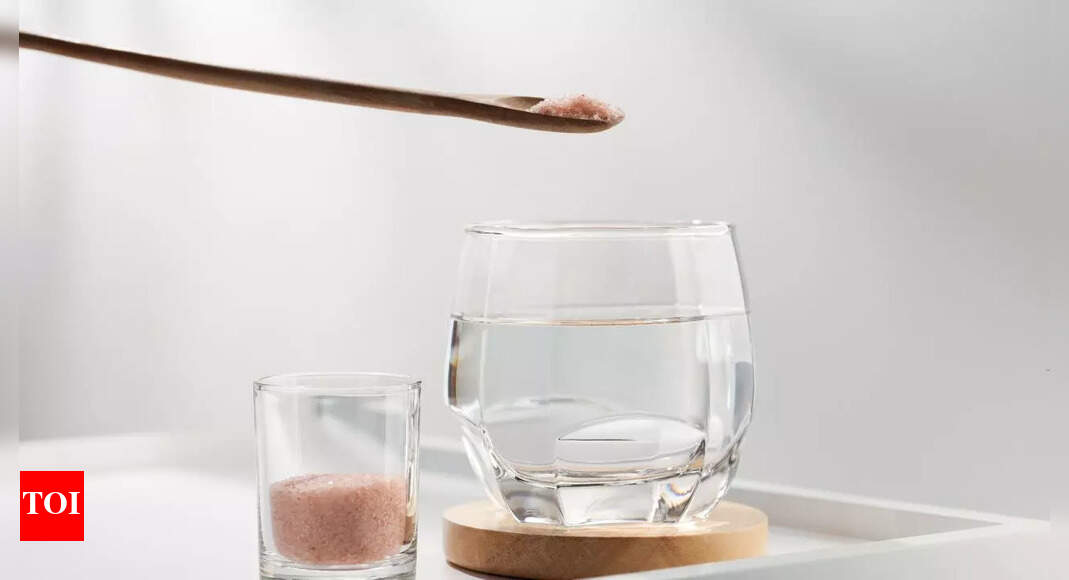In recent months, a growing wellness trend has taken over social media platforms like TikTok, where influencers and health enthusiasts recommend adding sea salt, especially Celtic sea salt, to drinking water. Advocates claim this simple practice can improve hydration, support digestion, boost skin health, and restore electrolyte balance. Unlike processed table salt, Celtic sea salt is rich in trace minerals such as magnesium, potassium, and calcium. According to a study published in the Journal of the International Society of Sports Nutrition, adding a small amount of salt to drinking water can help maintain electrolyte balance and improve hydration, especially during prolonged exercise or heat exposure. It is believed that these minerals help the body absorb water more efficiently.
Understanding celtic sea salt and its benefits to improve overall health
Celtic sea salt is an unrefined salt harvested from the coastal regions of France. Unlike table salt, which undergoes extensive processing, Celtic salt retains its natural mineral content. The extraction process involves allowing seawater to evaporate in clay ponds, followed by the use of wooden rakes to collect the salt, ensuring minimal processing and preserving its trace minerals.These trace minerals, which include magnesium, potassium, calcium, and iodine, are often cited as the primary health benefits of Celtic sea salt. However, it’s important to note that while these minerals are present, they are in relatively small quantities. For instance, Celtic salt contains about 85 to 90% sodium chloride, which is comparable to other sea salts like Cornish or Himalayan salt, but with a slightly lower sodium content
Potential benefits of sea salt in water
While the scientific backing is limited, proponents of the practice highlight several potential benefits:1. Enhanced hydrationThe presence of sodium in sea salt can help the body retain water, supporting cellular hydration. Sodium works with potassium to regulate fluid balance, particularly during intense physical activity or exposure to heat. This can be particularly useful for athletes or individuals who struggle with staying hydrated despite drinking plenty of water.2. Improved skin appearanceTrace minerals such as magnesium, calcium, and potassium found in unrefined sea salts are believed to contribute to healthier-looking skin. These minerals play roles in skin cell regeneration, pH balance, and reducing inflammation, potentially resulting in a clearer, more radiant complexion over time.3. Digestive supportSalt is essential for producing hydrochloric acid (HCl) in the stomach. Adequate stomach acid is crucial for proper digestion, especially for breaking down proteins and absorbing nutrients like vitamin B12, iron, and zinc. Adding a small amount of sea salt to water may help stimulate digestive secretions and support better nutrient absorption.4. Improved adrenal functionChronic stress can place a heavy burden on the adrenal glands, which regulate hormone production, including those involved in energy and hydration. Some practitioners of functional medicine suggest that unrefined sea salt may support adrenal health by providing trace minerals that help modulate stress response and maintain energy levels.5. Reduced cravings for sugary or processed foodsMineral deficiencies can sometimes trigger cravings, especially for salty or sweet snacks. By supporting the body with trace minerals found in sea salt, some individuals report reduced cravings and better appetite regulation. This may indirectly support healthier eating habits.6. Mild detoxificationSome holistic practitioners believe that the trace minerals in sea salt help facilitate natural detoxification processes in the body by supporting lymphatic flow, kidney function, and cellular waste removal. While this is largely anecdotal, many include sea salt as part of cleansing protocols.7. May help with muscle crampsSodium and magnesium are crucial for muscle function. A deficiency in either can lead to cramps or spasms, particularly during or after exercise. Including a pinch of mineral-rich sea salt in water might help reduce the risk of muscle cramps by supporting optimal electrolyte levels.8. Brain function and nerve communicationSodium and other electrolytes play a vital role in nerve transmission and brain function. Maintaining the right balance helps with concentration, mood regulation, and cognitive clarity. Some proponents claim that mineralised water can help prevent the sluggishness or mental fatigue associated with dehydration.9. Improved sleep qualityMagnesium, found in trace amounts in sea salt, is linked to better sleep and relaxation. While the amount in one glass of saltwater is small, consistent intake of trace minerals throughout the day, especially in the evening, may support more restful sleep patterns.It’s crucial to approach these potential benefits with caution, as the evidence supporting them is largely anecdotal and not robustly supported by scientific research.
Who should avoid adding sea salt to water
While a pinch of sea salt in water is generally considered safe for most healthy individuals, certain groups should exercise caution:
- Individuals with high blood pressure: Excessive sodium intake can exacerbate hypertension.
- Those with kidney disease: Impaired kidney function can make it difficult to regulate sodium levels.
- People on sodium-restricted diets: Those advised to limit sodium intake should avoid adding salt to their water without medical supervision.
The recommended daily intake of sodium chloride for adults is no more than 6g, which equates to about one level teaspoon. It’s important to consider all sources of sodium in your diet to avoid exceeding this limit.Disclaimer: This article is for informational purposes only and does not constitute medical advice. Always consult a qualified healthcare professional before making any changes to your health routine or treatment.Also read | Arjun Chaal benefits for heart health and control blood pressure naturally
